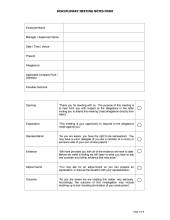Our Expertise > Employment Law > Serious Misconduct
 |
Misconduct, Serious Misconduct and NZ Employment LawDefinition of Misconduct and Serious Misconduct:
“Misconduct” means some form of wrongdoing. Usually it will involve deliberate wrongdoing, but there may be circumstances where an employee acts so carelessly that it amounts to misconduct (i.e. gross negligence or recklessness).
“Serious misconduct” involves serious wrongdoing. Where, after a fair process, it is established that an employee’s actions amount to serious misconduct, an employer may terminate the employee’s employment without notice (sometimes referred to as “instant” or “summary” dismissal). The misconduct must be sufficiently serious that it undermines the trust and confidence that the employer has in the employee (e.g. theft, sexual or other assault, or the use of illegal drugs at work). Sometimes employment agreements list conduct that the agreement says amounts to “serious misconduct”. If an employee engages in misconduct that is listed, that doesn’t necessarily mean that serious misconduct has automatically occurred. In every case the employer must consider all the facts and the employee’s response before it decides whether serious misconduct has occurred. When this is done, what looked like serious misconduct may not be so serious after all. Also note that minor misconduct cannot become serious misconduct just because it is on the serious misconduct list. Cavanagh v Fonterra Co-Operative Group Ltd 10 February 2010 CA 29/10
H Doyle [Employment Relations Authority - Christchurch]
UNJUSTIFIED DISMISSAL – Serious misconduct – Applicant driving milk tanker when trailer rolled – Respondent’s investigation concluded applicant drove tanker in incorrect and un... Application granted ; Reimbursement of lost wages (9 months) ; Compensation for humiliation etc ($12,000) ; Costs reserved Safe Air Ltd v Walker 07 August 2009 CC 8/09 Couch J [Employment Court - Christchurch] DRAFT HEADNOTE ONLY - DE NOVO CHALLENGE TO DETERMINATION OF EMPLOYMENT RELATIONS AUTHORITY - UNJUSTIFIED DISMISSAL - Serious misconduct - Defendant dismissed for inappropriate use of company email - D... Challenge granted ; Authority determination set aside ; Costs reserved The Chief Executive of The Department of Corrections v Tawhiwhirangi 13 September 2007 WC 14A/07 Shaw, J [Employment Court - Wellington] DE NOVO CHALLENGE AND CROSS-CHALLENGE TO DETERMINATION OF EMPLOYMENT RELATIONS AUTHORITY – Unjustified dismissal – Serious misconduct – Plaintiff alleged defendant assaulted prisoner... Challenge dismissed ; Cross-challenge dismissed ; Remedies deferred until further hearing ; Costs reserved Chief Executive of the Department of Inland Revenue v Buchanan and Anor 22 December 2005 CA 2/05 Chambers, O'Regan, Panckhurst JJ [Court of Appeal] COURT OF APPEAL – Application for leave to appeal against an Employment Court decision – Unjustified dismissal – Whether ignorance of contractual obligations by employees raised a pr... Appeal allowed ; Leave granted to appeal on the points of law relating to the legal test for disparity and disparity with subsequent cases ; Costs in favour of appellant ($6,000) ; Disbursements Disclaimer & Acknowledgement
The material featured on this page was sourced directly from the Department of Labour and is subject to Crown copyright protection. |


